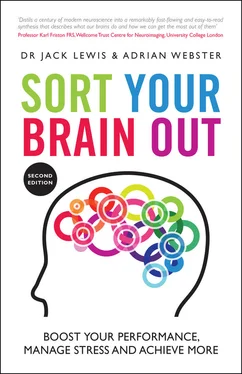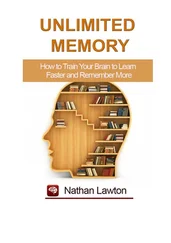If a teacher led you to believe that you were hopeless at maths, then a self‐fulfilling prophesy would be born. You would never again greet the prospect of having to do maths with any relish. This shortfall in enthusiasm would result in you not trying. The lack of effort would mean that your brain wouldn't really be stretched and so, as a direct consequence, it would be unable to adapt to improve your abilities. The inevitable poor results that followed would merely confirm your misplaced belief that you are “no good at maths.”
The exact opposite also applies, only this time in a self‐propelling, upwards direction. If you really believed – because a figure of authority convinced you of your “inherent” talent – that you were good at maths, then of course you would be inspired to do more maths. The consequence of your newfound dedication would mean your brain would be continuously challenged and, as a direct result, would be forced to adapt to do it faster, better and more efficiently each time. With your brain now having invested in some much‐needed rewiring, your maths skills would improve, bringing you closer to your true potential and, in turn, you'd be even more motivated to do more maths.
You can't teach an old dog new tricks, huh? Well, that may or may not be true, but it's totally irrelevant to us humans. We most definitely can learn new tricks throughout life. We just need to get into the habit of lifelong learning to keep the brain circuitry nice and malleable.
It is true that the brain is particularly adaptable during childhood and adolescence. Kids seem to absorb information like sponges, which can make us adults feel as though we have permanently lost our natural capacity to learn new tricks. This is completely untrue. We just don't acquire new skills as rapidly as younger brains do – largely a consequence of how much time we spend each day trying to pick up new skills. Children do it all the time, whereas we grown‐ups only do so much, and far less often. Herein lies a crucial difference that explains why, through practice, kids pick things up more quickly than adults: your brain learns to learn during childhood and gets better and better the more learning it does. Unfortunately, most adult brains have fallen out of the habit of learning because of the lack of demand placed on them to attempt new challenges every single day.
Challenge your brain regularly to learn and it will gradually reinvigorate the circuits that make learning happen rapidly. That's all there is to it.
Before the days of automated production lines, piece workers in pencil factories who had the monotonous task of bundling up pencils and packing them into boxes used to struggle at first to earn a half decent wage. The reason for this was that as “rookie bundlers,” being paid by the box, their productivity rate to start with was painfully slow.
The job involved them having to dip one hand into a huge container and depending on required bundle size, pull out an exact number of pencils. New starters would have to count the number of pencils in their hand each time, whereas experienced pencil packers could dip their hand in and instantly pull out an exact quantity. Having done it day in, day out, for long periods of time, their rewired brains had learned exactly what any given number of pencils felt like.
Seeing the astonishing packing speed that could be achieved by seasoned packers and driven by a desperate need to earn good money, novice bundlers’ brains were inspired to adapt quickly through trial and error to meet the demands of this dull but potentially financially rewarding skill. Unsurprisingly, thanks to neuroplasticity, their productivity rates soon shot up.
The human brain retains its ability to learn new skills well into the later stages of adulthood. Think about the number of people who, later in life, discovered the art of text messaging and, in a relatively short period of time, became fairly proficient at something that for most of their lives didn't exist. They may never become as quick as young “tech native” texters, most of whom appear to have been born texting, but just think how many older brains have managed to restructure themselves, creating new pathways to embrace a skill that not so long ago was completely alien to them.
Shortly after buying my first ever iPhone I seriously began to wonder if I'd made the right choice. I loved the phone but as soon as my fingers went anywhere near its touch screen, they inexplicably felt enormous! In comparison to using my old phone, sending texts and emails took ages .
It's only now since writing this chapter with Jack that I've suddenly realized that I'd totally forgotten about this problem. I'm back up to my old speed and my once super‐sized fingers have returned to normal. Brain plasticity in action, yet again .
– Adrian
Talking about new technology, consider a time when a friend or relative from an older generation was introduced to the internet for the first time. They might well have been pretty useless to begin with, but before you knew it they'd worked out how to forward those “funny” email circulars that you probably remember not being particularly amusing the first time round!
Older people can learn new tricks. There's no doubt about that. Convincing older people that this is the case can be tricky sometimes – old habits and stubborn mindsets can be tough to shift. But with a bit of self‐belief, a regular schedule of practise and a step‐by‐step approach that helps to focus the mind on a sequence of bite‐sized chunks, the only real difference is that older people learn with a slight reduction in speed. And this rate of learning depends largely on how recently they've successfully acquired a new ability, which in turn is powerfully influenced by how motivated a person is to embrace the discomfort of trying new things (that might make them feel stupid) throughout their adult life.
Adults who forever enjoy developing themselves and furthering their talents – whether it be learning a new language, doing some spare time studies, taking up a new sport or pursuing a newfound hobby – usually pick up most skills relatively quickly. That is by comparison with those who, since hitting adulthood, have never really stretched their brains, instead remaining happily cocooned, feet up and slippers on, in their same old comfy routines.
Understanding neuroplasticity inspires the dedication needed to tweak your habits to challenge your brain to expand your range of skills.
Numerous experiments have been carried out over the years with people practising new skills, varying from shooting basketballs to playing the piano. What's come to light is that – whether or not someone actually physically practises a skill or instead vividly pictures the process of doing it – after only a few days, marked functional changes happen in the brain. Incredibly, changes in those who had only imagined practising were almost as significant as those who had practised for real!

That the brain learns to learn throughout childhood is, admittedly, an odd concept to get your head around. As well as having to learn the very basics such as walking and talking in our first couple of years there was just so much to learn before we even got anywhere near stepping through the school gates – at which point intense learning became the “normal” state of affairs, both in the playground and the classroom, as we were regularly confronted with and tested by situations that took us out of our comfort zone. This happened not just in lessons, but also outside of formal learning times, as we navigated the twists and turns of learning how to get on with other people in all aspects of life. It could have been when practising sports skills, trying to work out the unfathomable rules of attraction or negotiating our way through daily social exchanges with family, friends, strangers and those regarded as arch enemies. Feeling out of your depth at that stage in life might not be particularly pleasant, but it's nonetheless a familiar, if not daily, occurrence. And it's relatively easy to deal with when everybody else is in the same boat.
Читать дальше













